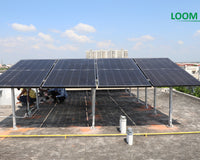Choosing the right battery capacity for a solar system is crucial part to ensure that you have a reliable and efficient power source for power backup. To determine the appropriate battery capacity, follow these steps:
-
Assess Your Energy Needs:
- Start by calculating your daily energy consumption in kilowatt-hours (kWh). You can find this information on your electricity bills.
- Start by calculating your daily energy consumption in kilowatt-hours (kWh). You can find this information on your electricity bills.
-
Determine Your Autonomy Requirement:
- Decide how many days of autonomy you need. Autonomy refers to the number of days your system can provide power without receiving any sunlight. For most residential systems, 1-3 days of autonomy is sufficient.
- Decide how many days of autonomy you need. Autonomy refers to the number of days your system can provide power without receiving any sunlight. For most residential systems, 1-3 days of autonomy is sufficient.
-
Calculate Battery Capacity:
- Use the following formula to estimate your battery capacity (in kWh): Battery Capacity (kWh) = Daily Energy Consumption (kWh) x Autonomy Requirement (days)
- Use the following formula to estimate your battery capacity (in kWh): Battery Capacity (kWh) = Daily Energy Consumption (kWh) x Autonomy Requirement (days)
-
Select the Battery Type:
- Choose the right battery for solar system. Common options include lead-acid batteries, lithium-ion batteries. The choice of battery type will impact factors like cost, cycle life, and maintenance.
-
Maintenance and Monitoring:
- Be aware of the maintenance requirements of the chosen battery type and invest in monitoring systems to keep track of your battery's state of charge and health.
Conclusion
Remember that sizing your battery bank is a critical aspect of your solar energy system, and it's essential to get it right to ensure reliable and efficient power storage. It's a good idea to consult a professional solar installer or an electrical engineer. They can provide personalized recommendations based on your specific needs and local conditions.












